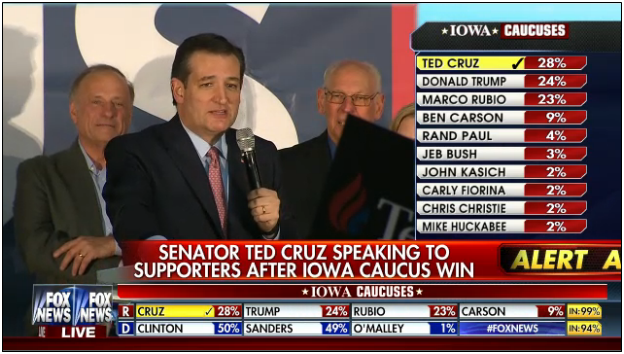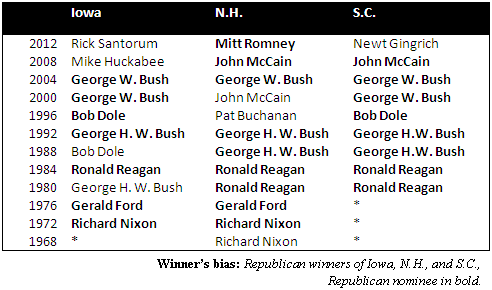The votes are in and the clear winner of the Iowa caucus on the Republican side was Sen. Ted Cruz with 28 percent of the vote, trailed closely by Donald Trump at a disappointing 24 percent and a better than expected Sen. Marco Rubio at 23 percent. Ben Carson and Sen. Rand Paul rounded out the second tier at 9 percent and 4 percent, respectively.
But the results show is that the top two vote getters, Cruz and Trump, got to where they are running campaigns against the political establishment in Washington, D.C. and that it may have even boiled down to almost a single issue litmus test by voters. And that is illegal immigration and where the candidate stood on it.
For, there is no question that Trump’s meteoric rise in the polls proceeded from his stand against illegal immigration in the U.S. And that, candidates like Jeb Bush and Marco Rubio withered after being associated with amnesty-like programs that would allow illegal immigrants to stay in the U.S.
Cruz for his part managed to navigate those waters as one of the few senators who stood firmly against President Barack Obama’s amnesty for millions of illegal immigrants with U.S.-born children. Nobody in Iowa had to really question where Cruz was on the issue based on his public record as a senator and where he had stood against the amnesty.
Plus, Cruz already had a rock-solid reputation for bucking the establishment in Washington, D.C. with his 2013 stand to defund Obamacare whose filibuster against funding implementation of the law stood as his exclamation point in public service.
At the end of the day, when the votes were cast, a not so silent majority of Republican voters in Iowa preferred candidates who had a hard line on illegal immigration or otherwise were a political outsider like Carson.
Consider, about 61 percent of caucus goers came in for Cruz, Trump and Carson combined. Compare that to about 26 percent for Rubio and Bush. And never have more voters showed up to the Iowa Republican caucuses in history, with turnout estimated at more than 182,000.
But how did we get here? How could the so-called establishment candidates have fared so poorly?
If the issue was illegal immigration, then for months it was all Trump, who clearly gets the credit for turning the tide politically on the issue, for setting the stage for the current debate and then standing his ground no matter what his opponents or the media threw at him.
Thought Trump’s assessment in his June 16, 2015 campaign announcement that illegal immigrants included criminals was too harsh? Less than a month later, 5-time deported illegal alien Juan Francisco Lopez-Sanchez had gunned down Kate Steinle on July 1, 2015 on a San Francisco pier while walking with her father.
Politically, the Steinle killing appeared to vindicate Trump’s assessment as the shock of the murder woke a lot of people up to the issue at a time when voters were still considering which issues would be important in 2016. Just looking at national polls, it was in July, not June, that Trump saw his major national surge. Was it this shooting? One cannot be certain, but it stands out.
Thought Trump’s call for mass deportation of 11 million illegal immigrants was outlandish or impossible, as Jeb Bush suggested at the Nov. 10, Fox Business-Wall Street Journal GOP presidential debate? Trump had an answer for that too. “Let me just tell you that Dwight Eisenhower, good president, great president, people liked him. ‘I like Ike,’ right? The expression. ‘I like Ike.’ Moved a 1.5 million illegal immigrants out of this country…”
Just like that, Trump’s program for deportation was on far more solid ground than his critics suggested with a very well-respected president who also as Allied Supreme Commander in World War II led the U.S. to victory in the 1940s — and who as president had done very much the same thing vis a vis mass deportation.
Turns out, Eisenhower achieved the deportation with no more than 700 Border Patrol agents who apprehended and removed as few as 80,000 illegal immigrants — and then scared another 1.3 million into voluntarily repatriating themselves for fear of capture by vastly overstating the size of government forces that would be engaged in the operation.
Thought Trump’s call to temporarily suspend Muslim immigration in the wake of the Paris and San Bernardino terrorist attacks was too far out there? Once again, Trump cited a past president, Franklin Roosevelt who had suspended immigration from Italy, Germany and Japan during World War II. “What I’m doing is no different than FDR,” Trump told “Good Morning America.”
It did not hurt him in the polls one bit. While other candidates and Congress were focused on limiting refugees from the war in Syria and Iraq, it turned out one of the San Bernardino shooters was in the U.S. on a fiancé visa, originally from Pakistan, with no prior record. What good was limiting refugees from two countries when the problem was coming from the much wider region where Islam is the dominant religion, and from legal immigrants?
These were key moments throughout 2015 for voters in the Republican presidential primary, and should not be discounted even as we reflect on these early results in Iowa. All the while, Trump owned the news cycle, changing the politics on the issue by decimating other candidates who had far softer positions on illegal immigration and refugees.
This ultimately benefited Cruz, now his key rival, primarily by helping to clear the field, and fueling voters’ appetite for an outsider, a role Cruz also serves. Cruz, determined and persevering, campaigned furiously in Iowa and clearly won the day.
Now, ironically, Cruz, who the Washington, D.C. political establishment abhors, may now be the only candidate who has a chance of slowing Trump down. Why?
With the 2016 Iowa caucuses now in the books now, and Trump to date leading polls substantially in New Hampshire and South Carolina, all eyes turn eastward, where the window of opportunity for slowing down his momentum is rapidly diminishing, although Iowa where Trump underperformed compared to polls clearly stands out as a wound.
Cruz’ win in Iowa now makes for an extremely competitive race nationally, with the biggest winner being the Republican Party itself. It will keep the candidates honest and offer more time for debate. The GOP can also brag it out-performed Democrats in sheer turnout by more than 10,000 voters — 182,000 to 171,000 — very telling after Democrats’ record performance in 2008 of 227,000. The enthusiasm advantage in this early going clearly goes to the GOP this time.
The biggest loser of the night was the Republican establishment that favored open borders and amnesty-like programs — and the candidates that represent them — who may have lost the election before a single vote was cast, and Cruz and the other politcal outsiders’ overwhelming success in Iowa may already be the first nail in the coffin.
Good riddance.
Robert Romano is the senior editor of Americans for Limited Government.








